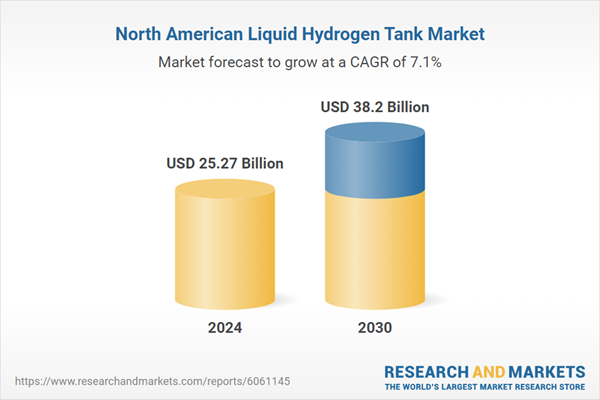Speak directly to the analyst to clarify any post sales queries you may have.
10% Free customizationThis report comes with 10% free customization, enabling you to add data that meets your specific business needs.
The market is growing as North America increasingly focuses on hydrogen as a cleaner alternative to fossil fuels, driven by the region’s commitment to achieving carbon neutrality and reducing greenhouse gas emissions. Liquid hydrogen, being a high-density form of hydrogen, requires advanced tank technologies that can safely store it at extremely low temperatures of around -253°C. This has spurred innovation in cryogenic storage technologies, leading to the development of more efficient, lightweight, and cost-effective hydrogen tanks. The rise in government incentives, such as subsidies for hydrogen infrastructure and fuel cell vehicles, along with corporate investments in hydrogen production and distribution networks, is fueling the demand for liquid hydrogen tanks.
Key Market Drivers
Increasing Adoption of Hydrogen as an Alternative Energy Source
The growing emphasis on sustainable energy sources and decarbonization has positioned hydrogen as a key player in the transition to clean energy. Hydrogen, particularly in its liquid form, is being increasingly recognized for its ability to be stored and transported efficiently, making it a promising alternative fuel for industries ranging from transportation to power generation. With significant investments in hydrogen infrastructure and the expanding use of hydrogen in fuel cells for both commercial vehicles and industrial applications, there is an increasing demand for liquid hydrogen storage solutions.This trend is further bolstered by government policies and incentives promoting hydrogen adoption, as well as the shift towards net-zero emissions goals in countries across North America. Liquid hydrogen, being a dense energy carrier, is crucial for long-distance transportation and heavy-duty vehicles, which require more energy-dense fuels to meet operational demands. The number of hydrogen fuel cell vehicles in the United States alone is projected to reach over 10,000 by 2025, indicating a strong upward trajectory in hydrogen demand and consequently, the need for liquid hydrogen tanks.
Key Market Challenges
High Capital and Operational Costs
One of the most significant challenges facing the North America Liquid Hydrogen Tank Market is the high capital and operational costs associated with liquid hydrogen storage systems. The construction of cryogenic storage tanks, the specialized equipment required to handle hydrogen at extremely low temperatures, and the need for advanced insulation technologies all contribute to substantial upfront investments. Maintaining these tanks over time involves costs related to energy consumption for liquefaction, regular maintenance to prevent leaks or degradation, and ensuring safety standards are met.For instance, hydrogen needs to be stored at temperatures below -253°C, which requires highly insulated tanks and energy-intensive refrigeration systems. This increases the overall operational expenditure, making it less attractive for industries, especially smaller companies or those with limited budgets. The high costs of liquid hydrogen storage infrastructure can delay the widespread adoption of hydrogen as a viable fuel source, especially in competitive industries where cost-efficiency is a critical driver. Although technological advances in storage systems are helping to reduce these costs, the financial burden remains a key barrier for scaling liquid hydrogen infrastructure.
Key Market Trends
Rising Investment in Hydrogen Infrastructure Development
A significant trend in the North America Liquid Hydrogen Tank Market is the increasing investment in the development of hydrogen infrastructure. Governments, private companies, and energy providers are making large-scale investments to build hydrogen production, storage, and distribution networks to support the adoption of hydrogen as a clean energy source. In particular, the United States has announced a series of funding initiatives aimed at creating hydrogen hubs, including the allocation of billions of dollars to support regional infrastructure. For example, the U.S. Department of Energy’s Hydrogen Hub Program is a key initiative designed to foster the creation of production, storage, and distribution facilities for hydrogen.Key Market Players
- BASF SE
- Vogel Holding GmbH
- H2scan Corporation
- Air Liquide S.A.
- Nel ASA
- Chart Industries, Inc.
- Hexagon Composites ASA
- Linde plc
Report Scope:
In this report, the North America Liquid Hydrogen Tank Market has been segmented into the following categories, in addition to the industry trends which have also been detailed below:North America Liquid Hydrogen Tank Market, By Type:
- Below 25 m³
- 25m³-45m³
- 45m³-100m³
- Above 100m³
North America Liquid Hydrogen Tank Market, By Application:
- Aerospace
- Industrial
- Transportation
- Energy
- Others
North America Liquid Hydrogen Tank Market, By Country:
- United States
- Canada
- Mexico
Competitive Landscape
Company Profiles: Detailed analysis of the major companies present in the North America Liquid Hydrogen Tank Market.Available Customizations:
With the given market data, the publisher offers customizations according to a company's specific needs. The following customization options are available for the report.Company Information
- Detailed analysis and profiling of additional market players (up to five).
This product will be delivered within 1-3 business days.
Table of Contents
Companies Mentioned
- BASF SE
- Vogel Holding GmbH
- H2scan Corporation
- Air Liquide S.A.
- Nel ASA
- Chart Industries, Inc.
- Hexagon Composites ASA
- Linde plc
Table Information
| Report Attribute | Details |
|---|---|
| No. of Pages | 120 |
| Published | March 2025 |
| Forecast Period | 2024 - 2030 |
| Estimated Market Value ( USD | $ 25.27 Billion |
| Forecasted Market Value ( USD | $ 38.2 Billion |
| Compound Annual Growth Rate | 7.1% |
| Regions Covered | North America |
| No. of Companies Mentioned | 8 |









